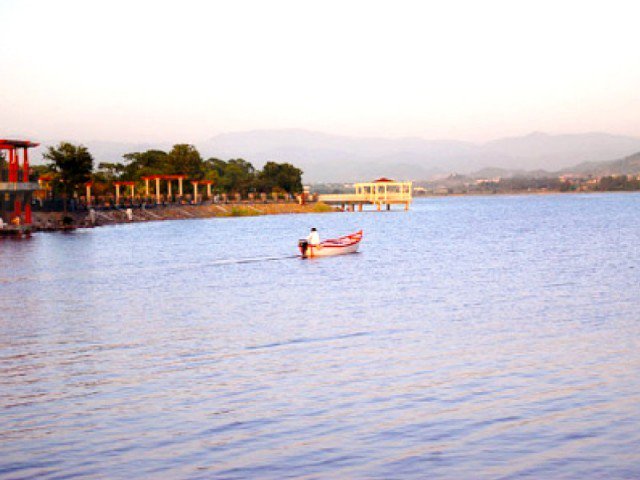
The Ministry of Climate Change (MoCC) had on Thursday announced plans to clean up the Rawal Lake together with the World Wide Fund for Nature (WWF) and the Capital Development Authority (CDA) as part of their efforts to observe World Wetlands Day. The lake was the obvious choice since it coincided with the day’s international theme of ‘Wetlands for a Sustainable Urban Future’.
Instead, representatives of governmental and non-governmental organisations, academia, research and youth-led organisations gathered at the pristine Lake View Park and picked up trash to highlight the importance of individual responsibilities towards the environment.
Inspector General of Forests (IGF) Syed Mahmood Nasir explained the relationship between wetland degradation and freshwater availability. He said that it was time to act against the adverse impacts of climate change and to promote a green-living culture in the country.
WWF-Pakistan Senior Director Programmes Rab Nawaz emphasised on the need for striking a balance between resource availability and resource consumption. Urging unity, he said that it is up to the young generation to maintain the momentum for environmental advocacy.
Islamic International University Islamabad (IIUI) Department of Environmental Sciences Chairperson Dr Ibrar Shinwari also shared his thoughts on the importance of wetlands and various plant species in Pakistan.
He urged that the youth must be sensitised about environmental issues and that a habit of planting trees and of not littering should be inculcated in children at an early age.
The health of over two million residents of Rawalpindi is at risk owing to the apathy of the managers of the twin cities of Rawalpindi and Islamabad and the ministry of climate change who have failed to build any sewage treatment plants (STPs) along the catchment areas of the Rawal Lake.
As a result, effluents and raw sewage continue to drain into the lake. Moreover, due to fewer rains year, pollution in the lake has been increasing.
Rawal Lake receives the bulk of untreated sewage and other wastewater from the fast-growing population located in the catchment area and of on the banks of the lake including Bara Kahu, Bari Imam, Shaadra, Bani Gala, Quaid-i-Azam University and other adjoining areas.
Despite the urgent need of building a sewage treatment plant, the government has been entangled in the familiar web of bureaucratic red tape.
In 2012, on the directions of the Supreme Court, the Rawal Lake Monitoring Committee had asked a private firm to identify the causes of pollution in the lake and to propose a solution.
The consultancy firm, Usman and Company, had proposed five sites where sewage treatment plants should be built. These plants, the firm had estimated, would cost around Rs2.4 billion to build.
The Islamabad Capital Territory (ICT) Administration had subsequently submitted a project concept-I to the finance ministry for final approval.
The concept paper was ultimately sent to planning division but progress on it has since stalled with apex planners distracted with other projects. Later in December 2015, an independent commission constituted by Islamabad High Court (IHC) had recommended to set up multiple sewage treatment plants in the catchment areas of the Rawal Lake.
Subsequently, a proposal to build five decentralised sewage treatment plants in the Rawal Lake upstream at an estimated cost of Rs2.258 billion had been jointly prepared by the CDA, the ICT and the Cabinet Division to provide clean drinking water to the residents of Rawalpindi.
But despite the passage of two years, no action has been taken to build the plants or a sewage network along the lake.
This despite the fact that IHC’s Environmental Commission in October 2015 had recommended that the Ministry of Planning and Development Reforms urgently release funds for the project.
“Many years ago, the Rawal Lake had the capacity to store between 37,000 and 47,000 acre-feet of water, and its water was crystal clear. But now its storage capacity has reduced due to the continuous flow of silt and other sewage into the lake. Its colour, too, had turned slightly brownish owing to the influx of polluted material,” said Siddiqa Malik, who lives in Bani Gala near the Rawal Lake.
Published in The Express Tribune, February 3rd, 2018.

1723278472-0/BeFunky-collage-(4)1723278472-0-165x106.webp)


1719564405-0/BeFunky-collage-(19)1719564405-0-165x106.webp)
1732525382-0/Express-Tribune-(10)1732525382-0-270x192.webp)


1732523977-0/Copy-of-Untitled-(82)1732523977-0-270x192.webp)
1732520846-0/Copy-of-Untitled-(79)1732520846-0-270x192.webp)
1732515558-0/Copy-of-Untitled-(76)1732515558-0-270x192.webp)






COMMENTS
Comments are moderated and generally will be posted if they are on-topic and not abusive.
For more information, please see our Comments FAQ